by Emma Prichard
Jane Morrison was an independent film maker and teacher, first at Cony High School in Augusta, Maine, at Columbia University School of Film, and abroad. Her body of work spans experimental films, documentaries, and a feature film. Her films show both a devotion to her home state, highlighting Maine locations and artists, and an eye for the wider world, telling the stories of people with greater and greater scope. Sadly, her work was cut short. She passed away in 1987 at the age of 39, after contracting malaria while working as part of the USIS cultural exchange program in Kenya.
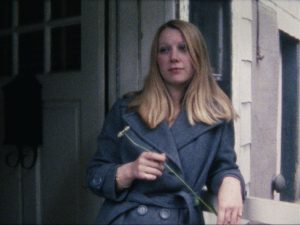
                   Still from ‘Lipstick’, 1974.
Morrison’s work has been preserved at Northeast Historic Film through two separate grants. The film most frequently requested is probably ‘Lipstick’. Previously titled ‘Lipstick ‘74’, it was preserved through the New York Women in Film and Television Women’s Film Preservation Fund, and was screened at MOMA in 2015, alongside Marguerite Paris’s ‘All Women are Equal’ and Cheryl Dunye’s ‘The Watermelon Woman’. Most recently, ‘Lipstick’ was screened at the Barbican Center in London for their Artists & Activists: Second Wave Feminist Filmmakers event. For more on NHF’s work on ‘Lipstick’ see Karin Carlson-Snider’s blog post The Trouble with Lipstick Several of Morrison’s other completed works have been digitized through the Woman Behind the Camera project. Other short films, outtakes, and film elements await digitization.
I recently embarked on a project to re-labeling and catalog 342 film elements in the Jane Morrison Collection. These include sound clips, outtakes and various other pieces. Some we know belong to Morrison’s completed works. The majority are elements from her feature film ‘Los Dos Mundos De Angelita’, (The Two Worlds of Angelita) a Spanish language film with English subtitles that follows a young girl, Angelita, as she and her family move from Puerto Rico to New York City. Made in the early 1980s, its topics of Puerto Rico’s relationship to the continental US, gender roles, and the challenges faced by lower-income families, are still relevant today. ‘Los Dos Mundos De Angelita’ won Morrison two awards: a blue ribbon at the American Film Festival in New York, and the Prix d’Honneur at the Biarritz Festival in France. In 1996 it was shown at the third annual Women’s Film and Video Festival at the Portland Museum of Art, along several of Morrison’s other films.
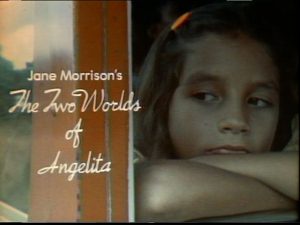
Still from the trailer for ‘Los Dos Mundos De Angelita’.
While examining some of the tapes from the collection I found, folded inside the case of one Umatic tape, a letter from the Atlas Center for Film and Video. The friendly, casual letter, formally printed on letterhead, deals with the production of ‘Los Dos Mundos De Angelita’. A hand written note on the bottom reads: “P.S. The hot blooded Latin with the shorts says Hello!” There’s a story there.
Northeast Historic Film also has Jane Morrison’s other papers. These include cue sheets for both ‘Los Dos Mundos De Angelita’ and ‘Master Smart Woman’, a documentary about Maine author Sarah Orne Jewett. In addition to creating a short film of Jewett’s life, Morrison also created an adaptation of her short story ‘The White Heron’. The 26 minute film follows Sylvy, a girl who lives with her grandmother in rural Maine. Sylvy faces a moral dilemma when an hunter arrives and asks her to help him track down, and kill, a white heron for study. An adaptation of Jewett’s most famous story, ‘The Country of Pointed Firs’, was in the works in 1982, but never completed. A draft of the script is included in the papers.
Perhaps the most enlightening piece of Morrison’s papers is her sketch book. The over-sized pages include storyboards, notes and criticisms. The sketches give hints to her film making process. Though who exactly she is swearing ‘REVENGE’ on, I’m not sure.
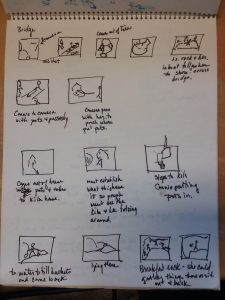
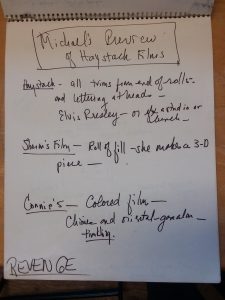
Pages from Jane Morrison’s sketchbook, with notes for her films ‘Muscongus Pond: A Potter’s Place” and “In the Spirit of Haystack”.
In honor of Morrison’s life and work, the Jane Morrison Memorial Film Fund was established with the Maine Community Fund in 1995. Now managed by the Maine Arts Commission, it is still providing funding for filmmakers in Maine. The fund gives grants of up to $2000, primarily to support tuition for workshops and other training. Hopefully, Jane Morrison’s work will continue to inspire future film makers.
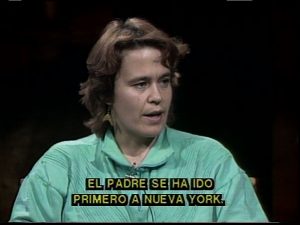
Morrison being interviewed after the release of ‘Los Dos Mundos De Angelita’, for the Boston Channel 5 program ‘Aqui’.

1 comment on “Piecing Together the Jane Morrison Collection”